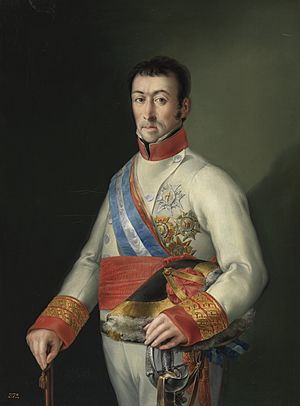Francisco Javier de Elío facts for kids
Quick facts for kids
The Most Excellent
The Marquess of Vesolla
|
|
|---|---|

Portrait by Miguel Parra, ca. 1815
|
|
| Viceroy of the Río de la Plata | |
| Personal details | |
| Born | 5 March 1767 Pamplona, Spain |
| Died | 4 September 1822 (aged 55) Valencia, Spain |
Francisco Javier de Elío y Olóndriz (born in Pamplona, 1767 – died in Valencia, 1822) was an important Spanish soldier. He served as the governor of Montevideo.
He also played a key role in bringing back absolute rule in Spain. This happened after King Ferdinand VII returned to the throne. Because of his actions, Elío was executed during a period called the Trienio Liberal.
Elío as Political Chief of Río de la Plata
Francisco Javier de Elío was the governor of Montevideo from 1807 to 1809. During this time, he tried to work against his boss, Santiago de Liniers. Liniers was the Viceroy of the Río de la Plata, a high-ranking official in the Spanish colonies.
Elío's plan failed because Liniers had the support of Cornelio Saavedra and local militias. These militias were made up of people born in the Americas, called criollos.
In May 1810, the next viceroy, Baltasar Hidalgo de Cisneros, was removed from power. This happened during the May Revolution, a movement for independence. Elío kept control of Montevideo and the area known as the Banda Oriental.
He then declared himself the Viceroy of Río de la Plata. The Spanish government in Spain, called the Cortes of Cádiz, confirmed him as the Political Chief on January 19, 1811.
One month later, the people living in the countryside of the Banda Oriental also rebelled against Spain. They were led by José Gervasio Artigas. In May, Elío's troops were defeated in the Battle of Las Piedras.
Elío was left in control of only Colonia del Sacramento and Montevideo. He decided to return to Spain on November 18, 1811. He officially resigned as Political Chief in January 1812.
Elío's Return to Spain
When King Ferdinand VII of Spain came back to Spain in 1814, he had been exiled in France. The Spanish government, the Cortes, wanted him to follow the liberal Spanish Constitution of 1812. This constitution limited the king's power.
However, Ferdinand refused to accept these limits. Instead of going to Madrid, he went to Valencia. On April 17, General Elío met the King there. Elío encouraged the King to take back all his absolute powers. He also offered his troops to support the King.
Elío strongly believed in absolute rule, where the king has all the power. He played a big part in stopping those who supported the 1812 Constitution. Because of his actions, he was arrested during the Trienio Liberal, a period when liberals briefly held power. He was later executed.
See also
 In Spanish: Francisco Javier de Elío para niños
In Spanish: Francisco Javier de Elío para niños
- First Siege of Montevideo
- Dissolution of the Viceroyalty of the Río de la Plata
 | Tommie Smith |
 | Simone Manuel |
 | Shani Davis |
 | Simone Biles |
 | Alice Coachman |

